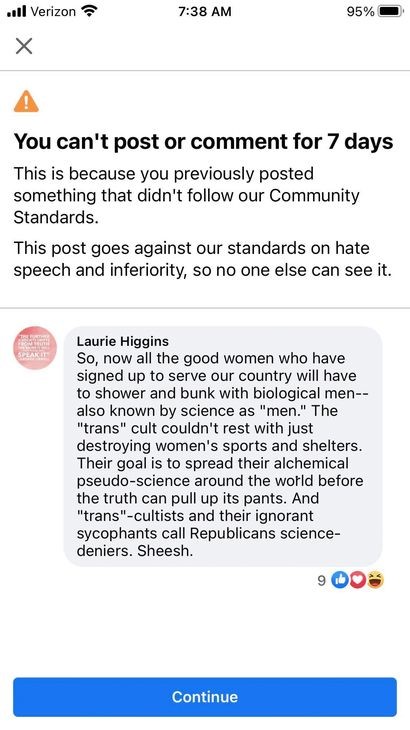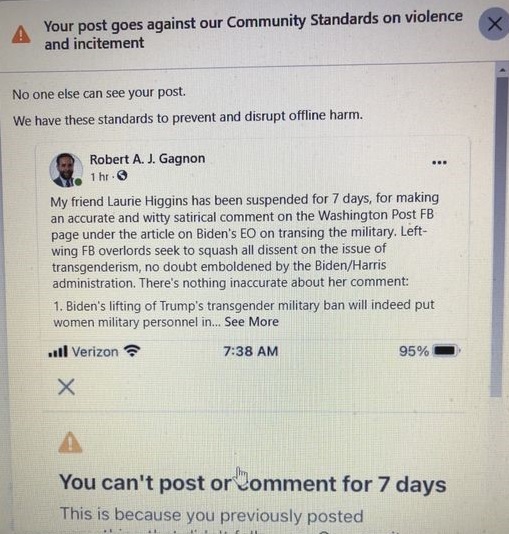How Facebook's Censorship Engine Became Anti-Christian
After a string of high-profile news stories in 2016 about ways disinformation had been promoted on Facebook, Mark Zuckerberg declared that his social networking company was working to “improve our ability to classify misinformation.”
In the five years since Zuckerberg’s announcement, Facebook has gradually been amassing an army of content moderators. 15,000 people now decide what should and should not be seen.
At a time when the worldview of millions of people is mediated by digital information, content moderation is no trivial matter. These content moderators—some employed directly by Zuckerberg, but most working for third-party vendors under contract with Facebook—may well be some of the most powerful men and women in the world today.
Although these content moderators do straight-forward work helping to eliminate spam, violence, and obscenity from the social media platform, there is also a very philosophical—even metaphysical—aspect to their work.
The Metaphysics of “Hate Speech”
Facebook has always claimed to be philosophically neutral, and not to censor anyone based on a belief system.
In a 2017 policy document explaining how they decide what should and shouldn’t be seen, Facebook declared that they will censor “hate speech.” The document goes on to define hate speech to include “anything that directly attacks people based on what are known as their ‘protected characteristics.’” The policy document, written by Richard Allan who worked for Facebook from 2009 to 2019, lists race, religious affiliation, sexual orientation, and gender identity among these “protected characteristics.”
While Facebook’s policy sounds like a straightforward prevention of cyber bullying, it actually opened up a Pandora’s box of philosophical questions. Here are just four questions raised by the 2017 document:
- Since Facebook lists “religious affiliation” as a “protected characteristic,” we naturally want to know if the company recognizes a difference between content attacking someone’s religious affiliation vs. simply criticizing religious truth-claims? Is the distinction between attacking and criticizing even meaningful within the conceptual framework used by Facebook? If it is not, is Facebook de facto prohibiting religious debate?
- There is currently a debate in the public discourse over whether gender and race are metaphysical. Classical and traditional philosophy has always maintained that gender is metaphysical while race is not, but progressives argue for the reverse. Since many now consider the classical view to be a species of racial bigotry and sex discrimination, does traditional metaphysics fall under Facebook’s definition of “hate speech?”
- Does the Bible and the Koran—which have passages condemning homosexuality—classify as hate speech against people of a certain “sexual orientation?” Some people are claiming to have been censored from Facebook for citing Scripture passages like Leviticus 18:22, and while we have not been able to verify if this is the case, a strict reading of Facebook’s policy document does raise the question of whether the Bible classifies as “hate speech.”
- In the public discourse there is currently debate around the question of whether biological sex should be included as a protected characteristic, with thinkers on the left saying no, and a number of pundits on the right saying yes. By including “gender identity” but not “biological sex” among protected characteristics, has the Facebook censorship engine implicitly taken a side in this debate?
Facebook cannot be immune to these important philosophical questions, for every time one of their 15,000 content moderators decides “this can be seen but this can’t,” they are making a decision pregnant with philosophical implications. Richard Allan, who wrote Facebook’s 2017 policy on hate speech and served on the UK House of Lords as a Liberal Democrat, cannot be unaware of this fact, even while helping to position the company as philosophical neutral.
Facebook Picks Sides
These questions are not merely hypothetical. Earlier this year Facebook issued a seven-day ban against Laurie Higgins of the Illinois Family Institute’s Cultural Affairs. What type of hate speech was Higgins guilty of committing? She spoke out against President Biden’s executive order promoting transgenderism in the military. Here is a screen shot of Higgins’ censored post.

When the Bible scholar, Robert A.J. Gagnon, heard that Higgins had been suspended, he used the social network to defend his friend. Gagnon, who is professor of New Testament Theology at Houston Baptist University, wrote the following on Facebook:
- Biden’s lifting of Trump’s transgender military ban will indeed put women military personnel in the awful position of having to shower with biological males.
- Trans-promoters aren’t content with having men invade the domain of women’s sports and shelters.
- “Transgender” ideology is indeed a pseudo-science, compelling people to reject basic biological facts.
- Promoters of “transgenderism” do indeed exhibit traits of a religious cult in their mind-numbing, science-denying conformity. The censoring and suspending of Laurie Higgins rather proves the point, doesn’t it?
Retribution against Professor Gagnon was quick. Facebook accused the theology professor of transgressing their standards on violence and incitement. Here’s a screen shot Dr. Gagnon took of what he saw on his computer screen:

Facebook doesn’t want to admit it, but by weighing in so forcefully against Christian theology in support of the new transgender metaphysics, Zuckerberg’s company has become one of the world’s most powerful lobbies for mainstreaming philosophical ideas that were unheard of until comparatively recently.
Until recently, Mark Zuckerberg could side-step the question of his philosophical commitments, claiming never to take sides while doing exactly that. Even as late as 2019, he still insisted that it was more important to give everyone a voice than to enforce a specific philosophical or political agenda. But after the turbulent events of 2020 and 2021, Facebook’s sham neutrality began to unravel. We will cover what happened next in a follow-up post.
Further Reading
- Time to Cancel Cancel Culture, by Emily Morales
- Cancelling Women, by Robin Phillips
has a Master’s in History from King’s College London and a Master’s in Library Science through the University of Oklahoma. He is the blog and media managing editor for the Fellowship of St. James and a regular contributor to Touchstone and Salvo. He has worked as a ghost-writer, in addition to writing for a variety of publications, including the Colson Center, World Magazine, and The Symbolic World. Phillips is the author of Gratitude in Life's Trenches (Ancient Faith, 2020) and Rediscovering the Goodness of Creation (Ancient Faith, 2023) and co-author with Joshua Pauling of Are We All Cyborgs Now? Reclaiming Our Humanity from the Machine (Basilian Media & Publishing, 2024). He operates the substack "The Epimethean" and blogs at www.robinmarkphillips.com.
• Get SALVO blog posts in your inbox! Copyright © 2026 Salvo | www.salvomag.com https://salvomag.com/post/the-metaphysics-of-facebook



















